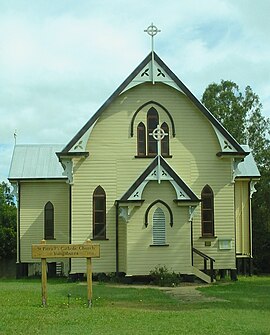Yungaburra, Queensland
|
Yungaburra Queensland |
|||||||||||||
|---|---|---|---|---|---|---|---|---|---|---|---|---|---|

St Patrick's Catholic Church (built 1914)
|
|||||||||||||
| Coordinates | 17°16′16″S 145°34′59″E / 17.27111°S 145.58306°ECoordinates: 17°16′16″S 145°34′59″E / 17.27111°S 145.58306°E | ||||||||||||
| Population | 1,106 (2011 census) | ||||||||||||
| Established | 1886 | ||||||||||||
| Postcode(s) | 4884 | ||||||||||||
| Elevation | 750 m (2,461 ft) | ||||||||||||
| Location | |||||||||||||
| LGA(s) | Tablelands Regional Council | ||||||||||||
| State electorate(s) | Dalrymple | ||||||||||||
| Federal Division(s) | Kennedy | ||||||||||||
|
|||||||||||||
|
|||||||||||||
Yungaburra is a town located on the Atherton Tableland in Far North Queensland, Australia, not far from Cairns. In the 2011 census, Yungaburra had a population of 1,116 people.
Prior to European settlement the area around Yungaburra was inhabited by about sixteen different indigenous groups, with the custodians being Yidinji people and neighbouring Ngajanji people. The Queensland police and native troops carried out extensive massacres in the area to rid it of blacks. In one incident in 1884, at Skull Pocket just north of the town a group of Yidinji were surrounded at night, and at dawn mowed down after they fled on hearing the first shot. The children were brained or stabbed to death by native police.
In the early 1880s the area around Allumbah Pocket was used as an overnight stop for miners travelling west from the coast. In 1886 the land was surveyed, and in 1891 settlers moved in.
In 1910 the railway arrived, and the town was renamed Yungaburra, to avoid confusion with another town called Allumbah.
The name Yungaburra comes from Janggaburra, after janggaburru, the Yindiny word for the Queensland silver ash (Flindersia bourjotiana).
By 1911 indigenous numbers had fallen to 20% of the pre-settlement population due to disease, conflict with settlers and loss of habitat.
At the 2006 census, Yungaburra had a population of 932.
In 2006, The Atherton Tableland region was damaged by the Category 4 (on the Australian scale) Cyclone Larry. Of the 19 heritage listed sites in Yungaburra, only the roofs of the community hall, police station and one of the bush cottages were badly damaged, as were the front of the Yungaburra Butchery and Gem Gallery sign. The town was restored very quickly; little evidence of the cyclone is visible.
...
Wikipedia

